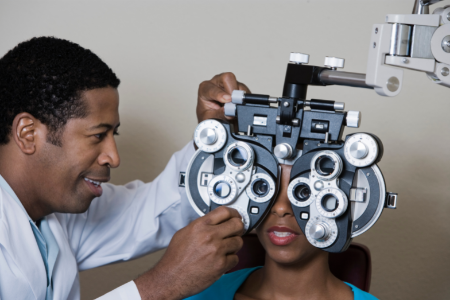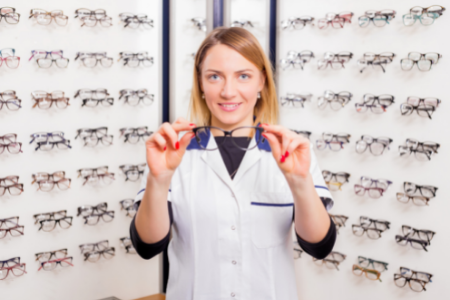- What is an optometrist?
- What is an ophthalmologist?
- How is an optician different from an optometrist or ophthalmologist?
- How do you know which kind of eye doctor you need?
- What kinds of eye diseases can an ophthalmologist treat?
- How often should I see my eye doctor?
There are two types of eye doctors that can provide you with vision care. There is also a third type of eye care clinician that is often mistaken for a doctor, but isn’t. We’re talking about optometrists, ophthalmologists, and opticians.
Which of these vision health professionals can help you when you have eye and vision-related needs? This blog will go over their differences to help you decide.
What Is an Optometrist?

Let’s start with an optometrist, who is the eye doctor that performs your vision exam and prescribes corrective lenses if you need them. Think of your optometrist as a primary care provider for your eyesight.
An optometrist attends college and then an additional four years in a doctor of optometry program. They may also even attend a specialty fellowship for a few years afterwards. Optometrists are licensed medical professionals that can:
- Perform vision testing and eye exams
- Search for abnormalities in the eye structure and performance
- Prescribe vision correctors like glasses and contacts
- Closely monitor eye conditions caused by chronic illnesses such as diabetes
- Treat and manage eye diseases such as glaucoma or dry eye
- Provide vision therapy or aids for low vision
If your eyes are having problems that are beyond their scope of expertise, your optometrist may refer you to a more specialized ophthalmologist. Let’s go over what an ophthalmologist can do to take your vision care one step further.
What Is an Ophthalmologist?
Ophthalmologists are eye doctors who, unlike optometrists, have a medical doctoral degree. These licensed professionals complete up to 13 years of education and advanced training. This allows ophthalmologists to do all of the work of an optometrist but also practice more specialized medicine and perform surgery.
An ophthalmologist can:
- Conduct vision testing
- Prescribe corrective lenses
- Perform eye surgery
- Treat diseases of the eyes
Some ophthalmologists specialize in the treatment of specific types of eye diseases such as glaucoma. Or, they may specialize in treating a subset of the patient population such as children. All of these additional training areas prepare an ophthalmologist to treat some of the most medically challenging conditions that your eyes can experience.
How Is an Optician Different From an Optometrist or Ophthalmologist?

An optician is licensed to fill corrective lens eye prescriptions and is trained to fit you with glasses. Opticians do not go to medical school but instead receive a one- or two-year certificate and diploma. They may also complete an apprenticeship in optical dispensing under supervision of another licensed optician. Then they apply for state licensure.
Some of the responsibilities of an optician include:
- Checking your eyeglasses prescription
- Adjusting, repairing, and fitting contacts, glasses and frames
- Taking measurements of your face for a glasses fitting
- Giving advice on the type of glasses you need
- Ordering and fitting corrective lenses
Opticians typically work in a storefront that sells glasses and contacts, although sometimes they work in an ophthalmology practice.
How Do You Know Which Kind of Eye Doctor You Need?
The logical place to begin your eye care is at the optometrist. An optometrist conducts regular eye exams to determine the health of your eye. During your exam, an optometrist will:
- Have you fill out a history form that includes any family history of eye disease
- Conduct vision testing to check your near and far eyesight
- Test your pupils for their responsiveness to light
- Perform tests on your peripheral vision, or your ability to see out of the corners of your eyes
- Conduct a tonometry test to check for an eye disease called glaucoma
Your optometrist will measure the pressure inside your eyes and look for any signs of diseases. If the optometrist finds any problems, you may be referred to an ophthalmologist. If you are prescribed contacts or eyeglasses, you will visit the optician to pick out your corrective lenses. Many ophthalmology practices are located within retail optical shops that sell lenses and frames.
If you are referred to an ophthalmologist, your visit will likely begin in a similar way, with a review of your history and a discussion of the findings of your optometrist. This is a fairly comprehensive exam and your visual acuity may be tested again. The doctor may conduct other tests to confirm a diagnosis of an eye disease.
Ultimately, your ophthalmologist will create a plan for treating any illnesses you have, which could include medications or potential surgeries to help your eyes function properly.
What Kinds of Eye Diseases Can an Ophthalmologist Treat?
 Ophthalmologists can treat basic eye conditions that people experience every day, such as near and farsightedness. They can treat more common eye illnesses such as cataracts, glaucoma, and more serious macular degeneration, all of which can lead to blindness.
Ophthalmologists can treat basic eye conditions that people experience every day, such as near and farsightedness. They can treat more common eye illnesses such as cataracts, glaucoma, and more serious macular degeneration, all of which can lead to blindness.
As you age, your eyes are vulnerable to potential diseases that can affect your vision and the quality of your life. Chronic illnesses such as high cholesterol or diabetes can further complicate your eye conditions or cause them to develop. An ophthalmologist is trained to treat these disorders in ways that can help you maintain a higher quality of life.
Ophthalmologists are also trained to treat less common eye conditions that occur from family genetics, injury, or other illnesses.
How Often Should I See My Eye Doctor?
You should regularly pursue preventative exams with your optometrist. An eye exam can detect illness during the early phases before serious damage to your vision occurs. The recommended guidelines for when to see your optometrist are based on your age and whether you’re having eye problems. You would generally see your eye doctor regularly if you:
- Wear prescription lenses
- Have a family history of eye illness
- Have a chronic disease that could affect your eyes
- Take certain medications that could cause side effects in your vision
Children three years and younger should be introduced to your eye doctor to look for any potential problems with the eye structure. School age children should see an optometrist at varying schedules depending on their physical needs. Adults who have corrective lenses should see their optometrist regularly.
If you are one of the lucky people who make it to age 40 without a loss of vision or any problems, it’s still recommended you have a full exam at that time to set a baseline for later care. Age 40 is a milestone for all kinds of reasons, but it’s also the time that many illnesses affecting the eye can begin. For those aged 60 or older, you should see your eye doctor every year or two.
At South Florida Eyecare Centers, we are standing by to help you through all the stages of your vision care. We specialize in optometric care for all ages with flexible payment plans. Call on us to find out how we can help.


